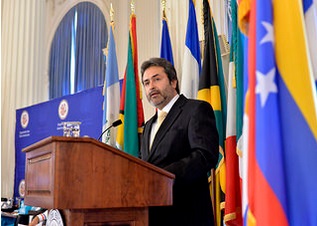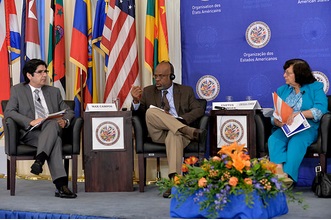
 The 59th Policy Roundtable of the Organization of American States (OAS), held today at the headquarters of the hemispheric Organization in Washington, DC, had as its central theme “Policy Dialogue on Climate Change: Challenges and Opportunities for the Americas.”
The 59th Policy Roundtable of the Organization of American States (OAS), held today at the headquarters of the hemispheric Organization in Washington, DC, had as its central theme “Policy Dialogue on Climate Change: Challenges and Opportunities for the Americas.”
In his introduction of the topic, Hugo de Zela, Chief of Staff of the Secretary General of the OAS, José Miguel Insulza, said that faced with the increase of the consequences of climate change on the planet and the region, it is essential to adopt policies on the issue. “The issue of climate change has ceased to be a debate, and is an issue that involves governance and public administration, and therefore involves all of us,” said Ambassador De Zela, who spoke on behalf of the leader of the Organization.
The Chief of Staff of the Secretary General of the OAS highlighted that while the effects of climate change affect everyone without distinction, “the poor are the most affected.” “You have to keep in mind that climate change will generate conflicts of all kinds and especially cause problems of equity in access to resources,” he said.
Ambassador De Zela said the OAS has the issue of global warming on its agenda, and as an example he recalled that in the recent OAS General Assembly, held in Paraguay, member states adopted the Declaration of Asuncion, where they resolved “to continue and strengthen our efforts to advance the implementation of the commitments on sustainable development and climate change, to counter the adverse effects of climate change.”
The Co-Chair of the Intergovernmental Panel of the United Nations on Climate Change (IPCC), Vicente Barros, recalled that regarding the issue of climate change, “some people are still in disbelief.” Barros said it is scientifically proven that in the world “since 1960 there has been a progressive warming, there is no doubt about it.”
The IPCC expert explained that on climate issues it is necessary to analyze the long-term data, because sometimes from one year to another the climate may undergo major changes in either direction, “but what matters are the long-term data.” Barros also showed a map prepared by the IPCC with 120 examples of incidents in different parts of the world attributable to climate change, noting that some 15 occurred in Latin America.
 For his part, the Permanent Representative of Peru to the OAS, Juan Federico Jiménez Mayor mentioned that the 2014 Climate Summit (called COP20) will be held in Lima at the end of this year, and that it aims to lay the groundwork for an agreement to make a qualitative leap in global negotiations to curb global warming, a process that should culminate in the meeting to be held in Paris in 2015.
For his part, the Permanent Representative of Peru to the OAS, Juan Federico Jiménez Mayor mentioned that the 2014 Climate Summit (called COP20) will be held in Lima at the end of this year, and that it aims to lay the groundwork for an agreement to make a qualitative leap in global negotiations to curb global warming, a process that should culminate in the meeting to be held in Paris in 2015.
The Peruvian diplomat said “the aim of the Lima meeting will be to serve as a prelude to the Paris meeting, where countries will sign a new protocol leaving behind the Kyoto Protocol,” which is the only such internationally binding document on the issue. In this area, he concluded, Peru and France are joining achieve support for the new protocol.
The Permanent Representative of Guyana to the OAS, Bayney Karran, spoke about climate change and the post-2015 development agenda from the perspective of the Caribbean, where the majority of governments, he said, support joint action against global warming. In that regard, he recalled the address of the Minister of Foreign Affairs of his country, Carolyn Rodrigues-Birkett, to the OAS General Assembly, where she warned about the consequences of the impact of climate change on the two main industries of the Caribbean: tourism and agriculture.
Ambassador Karran also said that CARICOM countries are already suffering the effects of climate change, citing hurricanes and floods that both the islands and the countries along the Caribbean Sea have undergone over the last decade. “The question is not ‘if’ it is included, but ‘how’ the issue of climate change is included in the post-2015 agenda”, said the Ambassador of Guyana.
 Following the presentations by Ambassadors De Zela, Jiménez and Karran, and the Co-Chair of the IPCC, a debate was held involving the Executive Vice President of the National Council on Climate Change of the Dominican Republic, Omar Ramírez Tejada; the Director of the Department of Sustainable Development of the OAS, Cletus Springer; and the Director of Climate Change Research of the Mexican Institute of Ecology and Climate Change (INECC) and member of the IPCC, Cecilia Conde.
Following the presentations by Ambassadors De Zela, Jiménez and Karran, and the Co-Chair of the IPCC, a debate was held involving the Executive Vice President of the National Council on Climate Change of the Dominican Republic, Omar Ramírez Tejada; the Director of the Department of Sustainable Development of the OAS, Cletus Springer; and the Director of Climate Change Research of the Mexican Institute of Ecology and Climate Change (INECC) and member of the IPCC, Cecilia Conde.
Executive Vice President Ramírez Tejada endorsed the words of the Secretary General of the United Nations, Ban Ki-Moon, who said that climate change “is the great challenge of the 21st Century,” and stressed that, in the specific case of the Americas, it is even more urgent to work to reduce the production of gases in the transport and energy sectors.
Director Springer, meanwhile, said that climate change also has an important political dimension, as it has impact on strategic areas for nations such as water and energy supply. Director Springer noted that climate change will also affect governments, especially from the weaker countries, because its effects will cause greater social conflict.
Director Conde, at the same time, referred to the agricultural sector in the Americas and its capacity to respond to climate change. The Mexican official said it is important to strengthen South-South cooperation in the fight against this scourge, and warned that “all models show a tendency to reduce the production of corn and wheat, if nothing is done,” which would have very significant consequences in many of the countries of the region.
The Roundtable was closed by the Permanent Observer of France to the OAS, Jean-Claude Nolla, who said that “a few years ago, the deniers did not want to see the challenges posed by the effects of global warming, and I think this has changed for good.” The French diplomat welcomed it because “now the effects of climate change are widely recognized,” and highlighted the responsibility of the OAS in this matter, because “it is the only forum that covers the whole Hemisphere.”
A gallery of photos of the event is available here.
The B-Roll of the event is available here.
For more information, please visit the OAS Website at www.oas.org.
 View Map
View Map